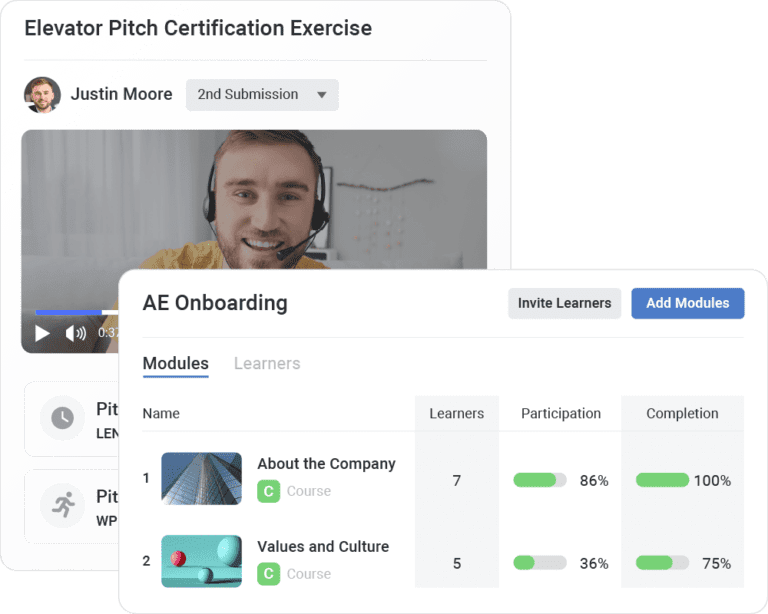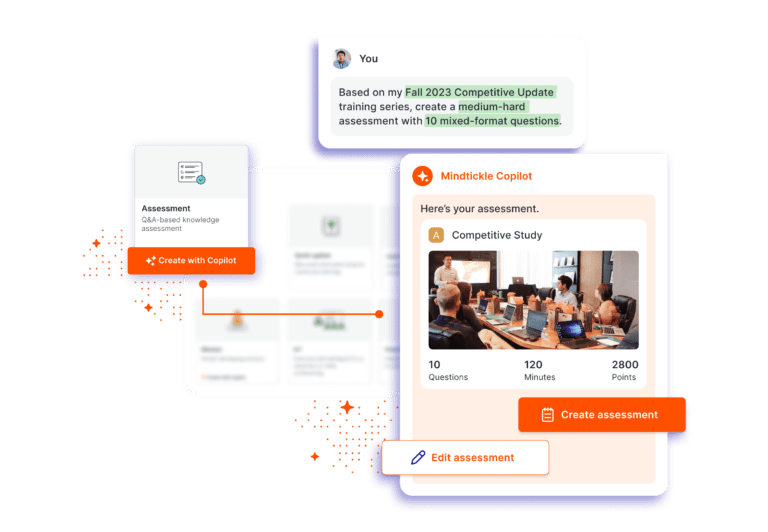What is Sales Everboarding? It’s More Than Ramp Times
![]() Helen Waite
on
August 19, 2021
Helen Waite
on
August 19, 2021
You’ve gotten the green light to hire more sales reps to support your organization’s growth goals. Now, the pressure’s on to get those reps ready to sell.
And for many businesses, it’s easier said than done. According to a report from Sales Enablement PRO, nearly a quarter of organizations say onboarding new hires is one of their top three sales challenges.
Of course, the VP of sales wants new reps ramped ASAP. But those sellers also need to retain what they learn – and gain a solid mastery of the skills that matter most in the field – if they’re expected to succeed. It can be challenging to strike the right balance.
The frustrating reality is that most sales onboarding programs fail to prepare sellers adequately with the skills and competencies they need to be successful.
One reason is that onboarding is often a “one-and-done” activity that doesn’t include ongoing exercises to ensure that knowledge and skills are applied in the field. It’s time for revenue leaders to focus on dynamic sales “everboarding” for their sellers. But what does sales everboarding mean?
Traditional sales onboarding isn’t enough
Let’s take a step back and talk about why traditional sales onboarding is not enough. There’s no doubt that onboarding is necessary to welcome new hires and get them familiar with your organization and their roles within it. And when it’s done right, onboarding can have an impact on an organization’s ability to meet its sales goals. In fact, research tells us that effective onboarding services that meet or exceed sales reps’ expectations can improve quota attainment by 16.2%.
So it’s probably not surprising that many sales enablement teams are laser-focused on creating sales onboarding programs that include some combination of bootcamps, instructor-led training, self-paced learning, on-the-job learning, and one-on-one coaching, among other elements.
All too often, though, organizations consider their reps to be ramped once they’ve completed their onboarding program. In fact, “onboarded” and “ramped” are often used interchangeably. What’s more, some organizations go so far as to financially reward reps for completing onboarding tasks as quickly as possible – without regard for how much of what’s learned in onboarding actually sticks in the field.
So it’s probably not surprising that many sales enablement teams are laser-focused on creating sales onboarding programs that include some combination of bootcamps, instructor-led training, self-paced learning, on-the-job learning, and one-on-one coaching, among other elements.
All too often, though, organizations consider their reps to be ramped once they’ve completed their onboarding program. In fact, “onboarded” and “ramped” are often used interchangeably. What’s more, some organizations go so far as to financially reward reps for completing onboarding tasks as quickly as possible – without regard for how much of what’s learned in onboarding actually sticks in the field.
And the unfortunate truth is that no matter how great your onboarding program, sales reps are bound to forget most of what they learn. Not convinced? According to Gartner, sales reps forget 70% of the information they learn within a week of training. And 87% forget it within a month.
To further complicate matters, most organizations’ products and solutions, markets, and selling landscapes are constantly evolving. So even though a rep has ticked off all of the boxes on the onboarding list, it’s very likely that whatever knowledge they gained initially will become stale in short order.
The bottom line is that even the best onboarding program isn’t enough to ensure your sellers have what they need to be successful in the field — and drive revenue for your organization.
It’s time to transition from static sales onboarding to sales everboarding
Of course, onboarding as we know it still has a role to play. But skill improvement shouldn’t stop when onboarding ends. Instead, organizations must build a culture of ongoing learning to ensure that reps – from recent college grads to veteran sellers – always have the skills they need to be effective and win deals. Yet according to Aberdeen Research, just over a third of companies extend their training programs beyond the first month of employment.
New reps (especially those new to selling) need constant reinforcement of key skills, and opportunities to practice what they’ve learned before money is on the line. And even the most seasoned reps require help getting up to speed on new product offerings, markets, and methodologies.

We want to challenge organizations to completely rethink their onboarding programs and move towards a more dynamic sales everboarding approach.
Here at Mindtickle, sales everboarding is a term we use to describe the continuous learning that helps ensure reps are always ready to sell. Everboarding strategies can include a number of different learning formats (instructor-led training, video-based micro-learning, curated content, quizzes and assessments, and more) that are individualized based on skills and needs, along with reinforcement exercises, role-play practice, and guided coaching opportunities, to name a few. The combination of activities really depends on the goals of the training – as well as both individual and team needs.

All sales reps benefit from sales everboarding. But it’s important to remember that a one-size-fits-all approach to ongoing learning simply isn’t effective. Each seller has different strengths and weaknesses – and learns in different ways.
As such, sales leaders must make it a priority to deliver ongoing learning opportunities that address each seller’s knowledge gaps in a way that works for that seller. To do that, sales leaders must have access to data that allows them to identify and address issues early on.
Make the transition to sales everboarding
Viewing sales onboarding and ramping as one and the same is a big misstep that can leave your reps ill-equipped to sell. Now’s the time to move toward a dynamic sales everboarding approach that blends traditional onboarding with continuous, individualized training and reinforcement. Doing so will better equip your sellers with the skills they need to succeed in the field — and drive more revenue for your organization.
Ready to see everboarding in action?
See how Mindtickle helps winning orgs scale their onboarding programs and get reps productive faster.
Get Your Demo

